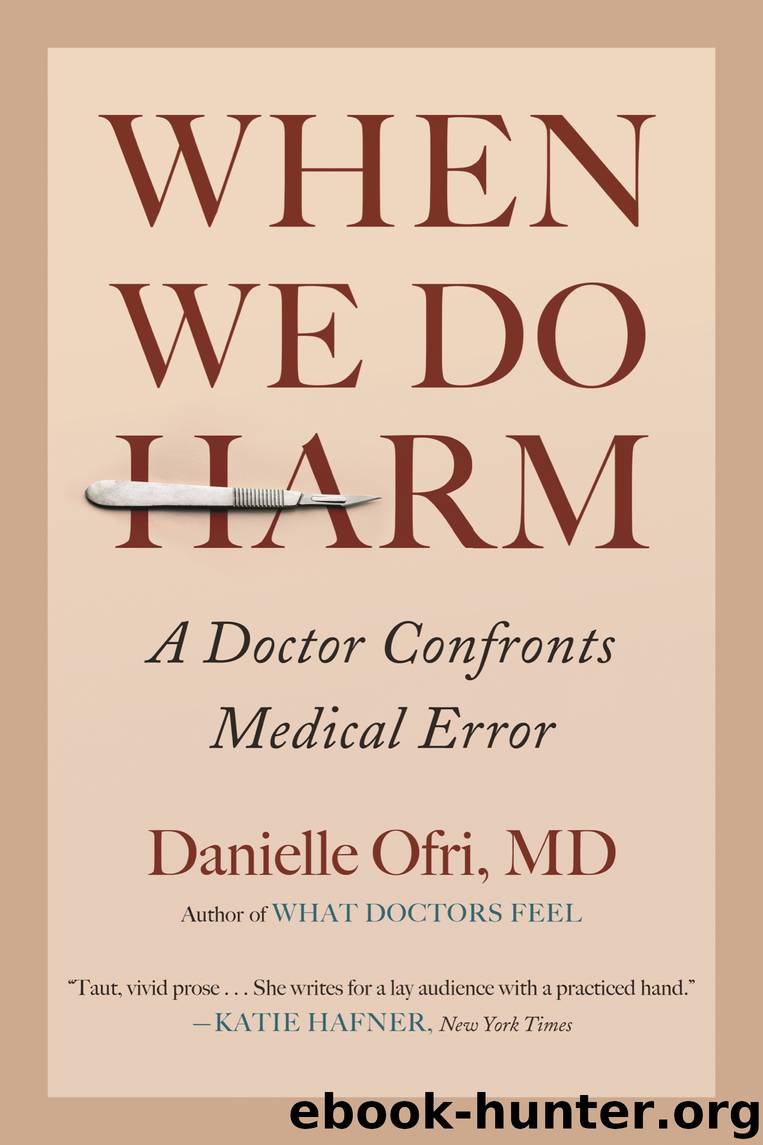When We Do Harm by Danielle Ofri MD

Author:Danielle Ofri, MD [Ofri, Danielle]
Language: eng
Format: epub
Publisher: Beacon Press
Published: 2020-05-15T00:00:00+00:00
CHAPTER ELEVEN
I’LL SEE YOU IN COURT
The idea of a legal redress for medical errors dates back almost four thousand years to the Babylonian Code of Hammurabi. It was a strict code, at least if the patient was a person of means: “If a surgeon performs a major operation on a nobleman with a bronze lancet and caused the death of this man, they shall cut off his hands.”1 Surgeons today are surely relieved that modern malpractice penalties center on financial compensation rather than amputations, but King Hammurabi laid down the idea that the doctor bears responsibility if medical care harms the patient. Additionally, Hammurabi developed the beginnings of a trial, with a panel of judges hearing the case, witnesses providing sworn testimony, judgments handed down in written form, and the option to appeal (to the king himself, of course).
The first malpractice case in the United States was in 1794 and focused on breach of contract rather than medical wrongdoing. A doctor promised to perform a surgery “skillfully” and evidently did not, causing the death of a patient. The patient’s husband sought redress for breach of contract and won. It took another half century before the idea of “standards of care” came into being, setting benchmarks for what medical care should be. The formation of the American Medical Association in 1847 was largely focused on the idea that there should actually be standards of medical care.
In order to prove malpractice in the modern legal system, four criteria must be met:
1. There is an actual doctor-patient relationship (that is, you can’t sue any random doctor; it has to be one who has actually taken care of you).
2. The doctor did not adhere to the standards of medical care.
3. The doctor’s substandard care was, in fact, the cause of the patient’s injury.
4. The patient’s injury resulted in quantifiable damages.
The second and third points are the meat of most malpractice cases. Lawyers have to prove not only that the doctor did not render the best medical care, but that the negligence actually caused the injury. In practice it can take years of investigation to work this out before a trial can even begin. Lawyers from both sides have to formally question the doctor, the patient, expert witnesses—what is known as the deposition process—in order to figure out if standard-of-care was indeed violated and if the doctor’s actions indeed caused the harm.
This process is extraordinarily expensive—requiring money for lawyers, expert witnesses, researchers, independent reviewers, court reporters, and videographers to film the depositions. This can add up to hundreds of thousands of dollars before anyone even sets foot in a courtroom. For this reason, malpractice lawyers are exceedingly selective about which cases they take. Most of the lawyers I spoke to said they have to turn down the overwhelming majority of the cases that patients bring to them. These lawyers work on contingency; that is, they get paid only if they win. Thus, they won’t even touch a case unless they are confident it is winnable
Download
This site does not store any files on its server. We only index and link to content provided by other sites. Please contact the content providers to delete copyright contents if any and email us, we'll remove relevant links or contents immediately.
Periodization Training for Sports by Tudor Bompa(8238)
Why We Sleep: Unlocking the Power of Sleep and Dreams by Matthew Walker(6686)
Paper Towns by Green John(5165)
The Immortal Life of Henrietta Lacks by Rebecca Skloot(4567)
The Sports Rules Book by Human Kinetics(4369)
Dynamic Alignment Through Imagery by Eric Franklin(4200)
ACSM's Complete Guide to Fitness & Health by ACSM(4043)
Kaplan MCAT Organic Chemistry Review: Created for MCAT 2015 (Kaplan Test Prep) by Kaplan(3994)
Livewired by David Eagleman(3757)
Introduction to Kinesiology by Shirl J. Hoffman(3753)
The Death of the Heart by Elizabeth Bowen(3596)
The River of Consciousness by Oliver Sacks(3590)
Alchemy and Alchemists by C. J. S. Thompson(3505)
Bad Pharma by Ben Goldacre(3414)
Descartes' Error by Antonio Damasio(3263)
The Emperor of All Maladies: A Biography of Cancer by Siddhartha Mukherjee(3134)
The Gene: An Intimate History by Siddhartha Mukherjee(3086)
The Fate of Rome: Climate, Disease, and the End of an Empire (The Princeton History of the Ancient World) by Kyle Harper(3048)
Kaplan MCAT Behavioral Sciences Review: Created for MCAT 2015 (Kaplan Test Prep) by Kaplan(2973)
